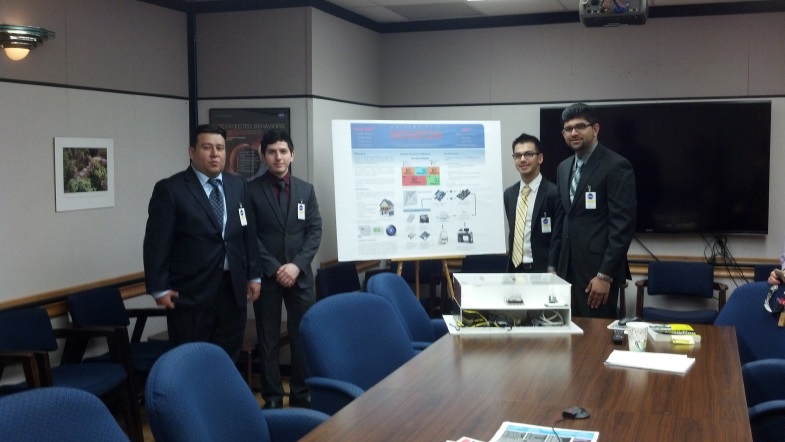
UH students present technology research to NASA
University of Houston College of Technology students Shoaib Osman, Refugio Ruiz, Lewis Cruz and Luz Gonzalez presented their research findings related to the use of Raspberry Pi technology to a large group of NASA scientists and engineers at the Johnson Space Center.
Facilities Management Assistant Director and Sustainability Lead Mike Burriello introduced the students, along with their research mentors for the project, College of Technology Associate Professor Dr. Driss Benhaddou and Facilities Management Control Lead Demond Williams.
A number of researchers are working on various concepts of smart buildings, and the concept of a living building seems to be a logical next step. A building is living in the sense that it learns how occupants and users behave and it adapts to that behavior autonomously without the intervention of a manager. This is the ultimate goal as the outcome of the research. The students explained that this does not mean that building service teams would be done away with because a building still needs maintenance and updating, similar to a living organism that needs maintenance, as with a visit to the doctor.
Even though automatic control of different components is a proven technology, developing buildings that can autonomously act on their own is still a research endeavor. Cyber-Physical Systems (CPS) concepts are being developed as a way to "deeply integrate computation, communication, and control into physical systems" as defined by the National Science Foundation.
This type of system can be programmed once and then it works to learn and improve itself. The system can learn on the basis of self-evaluations of its operations explicitly communicated by the users to the system. The system then uses this evaluation information, as well as user behavior, to modify itself in such a way that its performance improves over time.
This is the basis of the autonomous control research being undertaken at the University of Houston’s College of Technology. Starting with the theory of autonomous control of a home, utilizing the Raspberry Pi as the control agent, the researchers and students are now taking that success forward to incorporate two conference rooms in the Technology Building. As the research continues, the intent is to increase the size of the control system to incorporate a full building, then a group of buildings, then the entire campus becoming its own smart grid. The entire system can then be seen as a living organism, organized into subsystems, each subsystem learning from the other connected subsystems.
Burriello said that thanks go to Michelle Fraser-Page and Kimberly Reppa of NASA for allowing the students to present their work.
For more information regarding the Raspberry Pi student research, contact Michael Burriello at 713-743-4562 or mlburrie@central.uh.edu. Visit the Sustainability page under the Programs section of the Plant Operations website to learn more about the programs and services of Facilities Management Sustainability initiatives. Connect with Plant Operations on Facebook or tweet us @uhplantops.